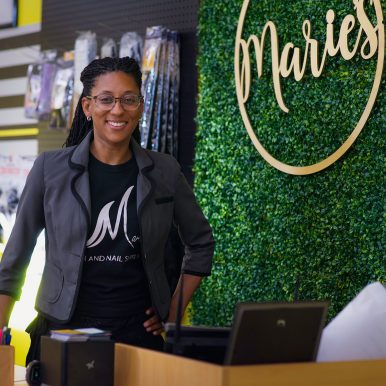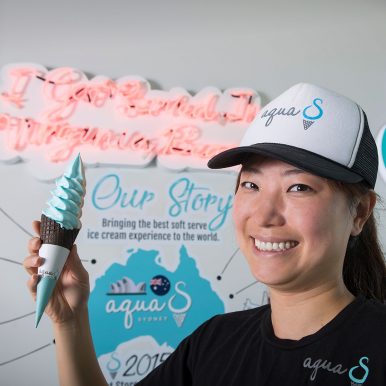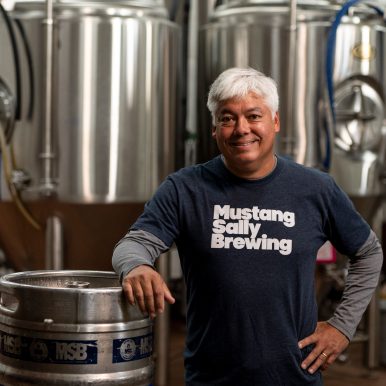Fighting back
Small businesses get creative battling inflation
Fighting back
Small businesses get creative battling inflation
Inflation and supply chain problems have pushed up the price of citric acid by 200%. That’s a problem for Crystal Wellman because citric acid is a primary ingredient in bath products she sells at Sugar + Spruce, her bath, body and skin care products shop in downtown Fredericksburg.
Wellman could try just raising prices, but she and other small business owners are instead seeking creative ways to push back against the fastest pace of inflation since November 1981. The consumer price index rose 9.1% year-over-year in June, before dipping in July to 8.5% due to falling gasoline prices.
Other ingredients used to manufacture Sugar + Spruce’s bath products have seen only slight price increases, says Wellman. But one of the shop’s top-selling products — bath bombs — cannot be made without citric acid to fuel its fizzing effect.
At the same time, “the in-store purchase amount is dropping. People are maybe holding on to their dollars a little more than normally. They’re not where they used to be,” says Wellman, who has been in business for 10 years.
“There are so many angles we’re getting hit at. We pay a lot of shipping. It feels like every time we order it’s a little different,” she says. “The margins are still very good but they’re not where they used to be. … The profit margins are from 75% to 85%.”

So far, Sugar + Spruce has made small price adjustments. Before the pandemic, customers purchasing products in bulk received a discount. That incentives gone now, and prices of individual items remain the same.
Wellman has bigger ideas “to get people to put more in their basket” again. She wants to bring back the fun of in-person shopping.
“We’re having more workshops on how to make candles. People are testing out products in the store, which they couldn’t do during COVID,” she says. “I feel like people are craving the experiences. Fredericksburg has a great historic downtown. People can meet friends, go to lunch, make candles, have a perfect afternoon.”
Tawann Scott, owner of Marie’s Hair & Nail Supply, a beauty supply store in Richmond, also is feeling the pinch of inflation and mapping out ways to counter the loss of business.
“I feel people are not spending as much. It’s not tremendous, but for us as a small business, every cent counts. I don’t know if big-box stores feel it as much. We depend on our community,” she says.
As wholesale prices have gone up, “we have to increase prices, pass it on to customers,” says Scott, who opened the store with family members in October 2021.
“We’re doing a few extra things, like running a few sales to attract more people, sending out coupons. We’re on social media constantly. That’s gone pretty well,” she says, adding that her shop recently was listed on BLK RVA, a Richmond Region Tourism website dedicated to Black businesses, culture and community.
Scott’s big idea is to confront the decrease in customer spending directly. She believes many women are not coming into the shop to buy products as often because they are having their hair braided — partly because it’s easy to maintain and partly as a money-saving measure. Getting your hair braided means you don’t have to pay to get it done again for two to three months, she explains.
“There are braiding products I probably could bring into the store. I could get additional types of braided hair,” says
Scott, who’s thinking about hiring a braider to work in the shop to attract more customers.
Like Scott, 5.4 million entrepreneurs filed applications to start new businesses in 2021, 53% more than in 2019, according to U.S. Census data.
Many of those new small businesses are in the service sector, according to Steve Cooper, a volunteer in Charlottesville with SCORE (Service Corps of Retired Executives), an organization partly funded by the U.S. Small Business Administration.
The nature of service-industry businesses can make inflation a little less onerous.
“They don’t buy a lot of stuff. It’s not like a manufacturing company,” Cooper says. Often one-person operations, these businesses don’t have to pay wages, and many are home-based, so they don’t have to deal with office overhead expenses.
The bigger problem for fledgling startups, according to Donald Jennings, a SCORE volunteer in Orange, is that “people starting businesses have a Pollyanna view of funding. Banks are not going to lend for an idea. You have to have a proven product or service. Funding is self-funding and [from] family. It’s bootstrapping.”
Jennings urges small business owners fighting inflation to “eliminate any unnecessary expenses, especially reoccurring expenses. Use the infrastructure you have to the maximum extent.”

Resilient industries
Coby Loessberg, president of Legendary Custom Signs & Graphics in Manassas, says his business is coping relatively well.
“The sign industry is pretty resilient to economic cycles,” he says. Although it saw some setbacks early in the pandemic when there was so much uncertainty, the industry picked up again quickly, with demand increasing for COVID-related signs and acrylic sneeze guards.
Loessberg’s sign company has raised prices in response to inflation, he says. “I tried to cover for a while, but our prices are driven by the supply chain, which is not predictable now. In some cases, materials have gone up. In some cases, they’ve gone up and come back down. Transportation costs for fuel were starting to come down, but now they’re going back up.”
Loessberg expected supply chain problems during the pandemic’s peak, “but I’ve been seeing more [problems] in the last six to nine months. Rigid material aluminum composite is harder to come by. It’s back-ordered,” he says. Before the pandemic, Legendary Custom Signs & Graphics kept a low inventory on hand, because it was easy to get supplies the next day. “Now we’re ordering three or four extra rolls of vinyl.”
The market for clear acrylic “got hit hard” because the product is used to make shields to protect cashiers and counter clerks against COVID. Manufacturers have since caught up with the demand but are now limiting production of acrylic to a smaller number of colors, according to Loessberg. “There’s not as broad an array. They’ve focused their manufacturing on the high-demand product. … It’s not like they’re going to build a new plant. They do more of one thing and do less of another.”
Madhu Garlanka, CEO of Allwyn Corp., a Herndon-based information technology services and consulting company with 200 workers, doesn’t have to worry about rising costs or shortage of raw materials. But, she points out, inflation has a significant “indirect effect” on businesses like hers.
“There’s the rising cost of people who are looking to increase their income. To retain people, you have to pay more,” Garlanka says. “As we look to source people for projects, it’s become a challenge.”
One way to meet the challenge, she notes, is to negotiate higher prices when customer contracts come up for renewal.
Another method is to take advantage of a wider hiring pool made available through remote work.
“In the past, we used to look for people local to where the client is located,” says Garlanka. “Now we’re able to hire people from lower cost-of-living areas. The workforce wants to work remotely.”
Ice cream and beer
The food and beverage industry has been especially hard hit by the rising costs of supplies and shortages of all types.
Ice cream shop owner Xiawei “Hawaii” Lin finds that “inflation is definitely causing the problem. Raw materials are costing more money. I believe it’s going to go up higher.”
Lin opened an Aqua S soft-serve ice cream franchise in Virginia Beach in December 2019. Since then, her cost for goods has gone up 20% to 30% and shipping costs have rocketed upward of 40%. Additionally, Virginia’s mandated minimum hourly wage went up to $11 in January and will rise to $12 at the beginning of 2023. Lin’s shop has about 10 employees.
Plus, she says, Aqua S faces supply problems. “We use ice cream powder from Italy. Ingredients are imported from Italy to corporate to us. There’s a limited quantity we can get.” Even products obtained locally, such as juice, are sometimes in short supply.

Combined, those factors mean that the cost of a soft-serve cone has risen from $4.75 to $5.75. “Our profit margin was usually around 40% when we opened. Right now, I can’t tell you. Now it’s maybe 10% to 20%,” Lin says. She’s received business assistance grants, but sometimes, she says, “we don’t know how we are going to keep the door open.”
Having more products that the shop can sell during the winter would help, Lin says, but being a franchise also means restrictions.
She’s making a big push to expand beyond the storefront. “We’re doing catering, weddings, birthday parties, business staff-appreciation events. We’re selling to restaurants. We’re partnering with nonprofits to have events.”
Sean Hunt, managing member and founder of Mustang Sally Brewing Co. in Chantilly, also has experienced “a pretty significant rise in costs. Things are going up across the board generally and, in a more exasperating way, with particular products.”
His brewery’s big cost items are grain, hops and fruit. The cost of grain has been slowly creeping up over the course of the past year, while the cost of hops “hasn’t increased as much,” he says. “Fruit is very variable. It seems to be going up and down. We’re trying to figure it out long term.”
Costs of canning supplies have gone up too, he says, bringing down the profit margin on Mustang Sally’s sale of canned beer products to grocery stores.
He estimates that prices of raw goods have gone up at least 10%, and that escalates to 15% when you factor in new surcharges that shippers have instituted to make up for rising fuel prices.
For now, Hunt says, “we’re absorbing the costs to some degree. We’ve increased prices slightly. The question is, how much do we pass along? We’ll assess that more probably next year.”
In the meantime, the brewery is reassessing the types of fruit it uses. “We do a lot of fruit beers. We’re using more of the fruit that’s available,” he says. For example, “there was a product we had been making that was blackberry-based. We were going to run that for another two months, but blackberry costs shot up, so we made a tangerine fruit beer.”
The best approach to the situation, Hunt believes, is to focus on something “that’s less affected by inflation” — the customer experience.
“Our theory here is that we’re not a restaurant, not a bar. Breweries are different. We’re 100% experience. People come here for something that’s really interesting,” he says. “The end game is that somebody has a lot of experiences to choose from, but at a reasonable cost.”
To create that experience, Mustang Sally hosts lots of events and offers plenty of craft beers that customers can’t find anywhere else, Hunt says.
“We want to make sure we are producing an interesting lineup. We try to make it fascinating. You can really do anything with sour beer. We’ve had a mango coconut raspberry tart beer. It’s fun. About every four months, we have a sour fest. We’ve had a Swedish Fish marshmallow sour.”
i
















